At WiseGEEK, we're committed to delivering accurate, trustworthy information. Our expert-authored content is rigorously fact-checked and sourced from credible authorities. Discover how we uphold the highest standards in providing you with reliable knowledge.
What Are the Different Uses of Sulfuric Acid?
There are many different uses of sulfuric acid, most of which are industrial in nature. This substance is a vital component in the industrial synthesis of many chemicals, though over half of the worldwide production each year is used to make phosphoric acid. Sulfuric acid is also an important contributor to the refining of oil, processing of ores and treatment of wastewater. Many different manufactured goods also depend on sulfuric acid, from cleaning the rust and oxidation off steel to fabricating chemicals, dyes and other substances. One of the other important uses of sulfuric acid is as the electrolyte in certain batteries.
Sulfuric acid is a type of mineral acid that was historically referred to as oil of vitriol. It is chemically composed of two molecules of hydrogen, one of sulfur, and four of oxygen, and it is both extremely corrosive and colorless. There are a number of sulfuric acid grades, ranging from 10% to 98% purity. Many of the middle and lower grades are prepared by mixing concentrated sulfuric acid with appropriate amounts of water. These grades were historically produced using a lead chamber process, which fell out of favor when the contact method of production was developed.

About 60% of all sulfuric acid produced in the world each year is used as an ingredient for making phosphoric acid. The most common method of phosphoric acid production involves introducing sulfuric acid to phosphorous rock. In addition to phosphoric acid, other products such as calcium sulfate and hydrogen fluoride are also produced through this process. Since phosphoric acid is an important component in fertilizers and detergents, sulfuric acid is necessary to the production of those products.

Some of the other uses of sulfuric acid are to treat, or remove impurities, from various substances. This is often the case in wastewater treatment, where sulfuric acid is often introduced to neutralize the pH or break emulsions. Sulfuric acid is sometimes also used in drinking water treatment facilities to remove impurities and create an improved taste. In oil refineries, it is often used as a catalyst in the creation of isooctane. The steel industry also uses it to remove oxidation and rust, either before delivering billets to industrial manufacturers, or prior to galvanization.
One of the uses of sulfuric acid that many people encounter each day is in batteries. The traditional lead acid batteries found in most automobiles use lead and lead oxide as anodes and cathodes, and sulfuric acid as an electrolyte. These batteries have poor energy-to-weight ratios, but can provide the high surge currents necessary for operating starter motors. They are also relatively inexpensive to produce compared to other battery technologies. It should be noted that sulfuric acid must be handled carefully, and should never come into contact with human skin, as it can cause severe burns.
AS FEATURED ON:
AS FEATURED ON:












Discuss this Article
Post your comments